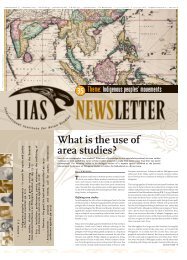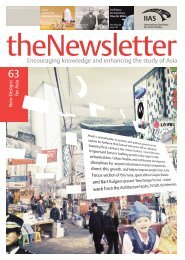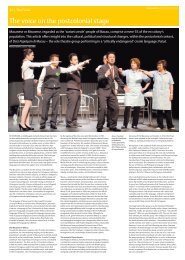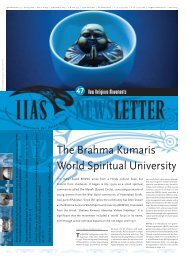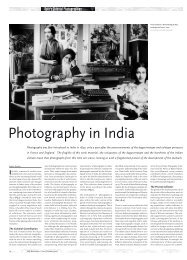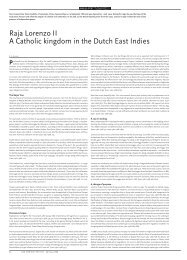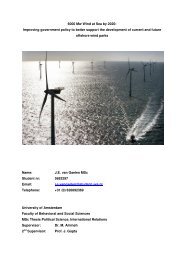10 The Study Race and empire Japan, the Hague Convention ... - IIAS
10 The Study Race and empire Japan, the Hague Convention ... - IIAS
10 The Study Race and empire Japan, the Hague Convention ... - IIAS
Create successful ePaper yourself
Turn your PDF publications into a flip-book with our unique Google optimized e-Paper software.
<strong>10</strong> <strong>The</strong> <strong>Study</strong><br />
<strong>The</strong> Newsletter | No.50 | Spring 2009<br />
<strong>Race</strong> <strong>and</strong> <strong>empire</strong> <strong>Japan</strong>, <strong>the</strong> <strong>Hague</strong> <strong>Convention</strong> <strong>and</strong> <strong>the</strong> prewar world<br />
It has often been observed that <strong>the</strong> <strong>Hague</strong> Peace <strong>Convention</strong><br />
of 1907 reflected <strong>the</strong> optimism <strong>and</strong> idealism of its age,<br />
however naïve. Its ideals remain a beacon for our times.<br />
<strong>The</strong>n <strong>and</strong> now, <strong>the</strong> <strong>Convention</strong> was cause for pride regarding<br />
<strong>the</strong> progress of human civilisation as a whole, <strong>and</strong> hope for<br />
a brighter <strong>and</strong> more humane future. But a look back at <strong>the</strong><br />
<strong>Hague</strong> <strong>Convention</strong>, <strong>and</strong> <strong>Japan</strong>’s place within it, also provides<br />
a lens onto <strong>the</strong> contradictions <strong>and</strong> ambiguities of a modern<br />
world founded on <strong>the</strong> imperialist law of <strong>the</strong> jungle.<br />
Ethan Mark<br />
A moment of optimism<br />
For <strong>Japan</strong>, <strong>the</strong> only non-Western imperial power, participation<br />
in <strong>the</strong> <strong>Hague</strong> Peace <strong>Convention</strong> of 1907 had a special symbolic<br />
meaning: It was a source of optimism <strong>and</strong> pride regarding<br />
<strong>Japan</strong>’s acceptance as an equal, autonomous, <strong>and</strong> civilised<br />
nation within <strong>the</strong> global community of nations. As such it<br />
was one of a series of events over <strong>the</strong> decade preceding it,<br />
including <strong>the</strong> victory over Russia in 1905, that marked <strong>Japan</strong>’s<br />
arrival as one of <strong>the</strong> world’s Great Powers. Yet for all <strong>the</strong><br />
optimism, <strong>the</strong> early 20th century world was also a divided<br />
<strong>and</strong> tough place, a world in which in many ways <strong>the</strong> law of<br />
<strong>the</strong> jungle applied to <strong>the</strong> competing Western powers, between<br />
<strong>the</strong> West <strong>and</strong> <strong>the</strong> Rest, <strong>and</strong> between <strong>empire</strong>s <strong>and</strong> colonies.<br />
In this context, <strong>the</strong> optimistic promise of <strong>the</strong> <strong>Hague</strong> <strong>Convention</strong><br />
could not in fact be shared equally by all, <strong>and</strong> as a non-Western<br />
<strong>empire</strong>, <strong>Japan</strong>’s position was in fact always a ra<strong>the</strong>r tenuous<br />
<strong>and</strong> ambiguous one.<br />
While recent history had taught <strong>the</strong> <strong>Japan</strong>ese to be wary<br />
of how <strong>the</strong>ir nation counted among <strong>the</strong> imperial powers,<br />
<strong>the</strong>re was perhaps no moment when <strong>Japan</strong>ese hopes for full<br />
inclusion among <strong>the</strong>m burned brighter than in <strong>the</strong> period<br />
of <strong>the</strong> <strong>Hague</strong> <strong>Convention</strong>. How far <strong>Japan</strong> appeared to have<br />
come in <strong>the</strong> 54 years since <strong>the</strong> first arrival of Perry’s warships<br />
in Edo (Tokyo) Bay in 1853. <strong>The</strong>n, Western force had compelled<br />
a weak, vulnerable <strong>Japan</strong> to open its ports, its economy,<br />
<strong>and</strong> its society to Western trade <strong>and</strong> Western ways. Forced<br />
to acknowledge that it was far behind <strong>the</strong> Western powers<br />
technologically, militarily, economically <strong>and</strong> institutionally,<br />
<strong>Japan</strong> had been subject to a humiliating series of ‘unequal<br />
treaties’ that compromised its sovereignty in areas such as<br />
international trade <strong>and</strong> legal jurisdiction.<br />
<strong>The</strong> forced ending of <strong>Japan</strong>’s 200-year self-imposed isolation<br />
from <strong>the</strong> West <strong>and</strong> <strong>the</strong> imposition of <strong>the</strong> unequal treaties<br />
resulted in both a severe sense of humiliation <strong>and</strong> severe<br />
economic instability. Combined with a number of complicated<br />
domestic factors, this in turn contributed to a period of turmoil<br />
that ultimately led to <strong>the</strong> establishment of a new political<br />
regime in 1868. <strong>The</strong> primary objective of this new Meiji State<br />
was to respond to this crisis <strong>and</strong> reverse <strong>Japan</strong>’s downward<br />
spiral in a threatening world. For more than 250 years, <strong>the</strong><br />
decentralised, feudal Tokugawa Order had proven a good<br />
system for keeping <strong>the</strong> domestic peace. But it was clearly<br />
entirely inadequate for surviving <strong>the</strong> rapidly changing<br />
<strong>and</strong> competitive international system of <strong>the</strong> 19th century.<br />
Signaling <strong>the</strong>ir openness to a new course, <strong>Japan</strong>’s new leaders<br />
embarked on a tour around <strong>the</strong> world in <strong>the</strong> early 1870s to<br />
observe <strong>the</strong> conditions that had made <strong>the</strong> West so strong,<br />
<strong>and</strong> <strong>the</strong> rest of <strong>the</strong> world so weak. Along <strong>the</strong> way <strong>the</strong>y not only<br />
visited <strong>the</strong> U.S. <strong>and</strong> Europe, but also journeyed through <strong>the</strong><br />
Suez Canal <strong>and</strong> witnessed conditions in <strong>the</strong> European colonies<br />
of North Africa, India, <strong>and</strong> Sou<strong>the</strong>ast Asia.<br />
What <strong>the</strong> Meiji leaders saw on <strong>the</strong>ir travels confirmed what<br />
<strong>the</strong>y had already witnessed from afar: To compete successfully<br />
in <strong>the</strong> modern international system, you needed to have a<br />
unified <strong>and</strong> industrialised nation-state such as those that had<br />
emerged in Britain, France, <strong>the</strong> Ne<strong>the</strong>rl<strong>and</strong>s, <strong>the</strong> US, <strong>and</strong>,<br />
more recently, Germany. Each had a powerful, respected <strong>and</strong><br />
effective central government, an educated <strong>and</strong> motivated<br />
population, military might, an enterprising industrial elite <strong>and</strong><br />
a strong sense of national mission. <strong>The</strong>se nation-states had put<br />
such a gap between <strong>the</strong>mselves <strong>and</strong> <strong>the</strong> rest of <strong>the</strong> world that<br />
<strong>the</strong>y could increasingly project <strong>the</strong>ir power across <strong>the</strong> globe.<br />
<strong>The</strong>re was no hiding from this reality any longer: Those who<br />
were not quick enough to achieve such central control, national<br />
unity, <strong>and</strong> technological advancement were doomed to colonial<br />
domination. <strong>Japan</strong> had to mobilise <strong>and</strong> concentrate <strong>the</strong> human<br />
<strong>and</strong> material resources needed for industrialisation <strong>and</strong> <strong>the</strong><br />
building of a strong military – <strong>and</strong> to do it quickly.<br />
For <strong>the</strong> non-Western world at least <strong>the</strong> last decades of <strong>the</strong><br />
19th century were tough ones. Historians refer to this period<br />
as <strong>the</strong> time of ‘High Imperialism,’ or, more colloquially, <strong>the</strong><br />
‘carving up of <strong>the</strong> Globe.’ Western expansion continued<br />
relentlessly into many parts of Africa <strong>and</strong> <strong>the</strong> Asian societies<br />
of Burma <strong>and</strong> Indochina. <strong>The</strong> scramble for imperial glory<br />
<strong>and</strong> <strong>the</strong> world’s resources intensified. Eyeing <strong>the</strong> worsening<br />
situation in neighbouring China in <strong>the</strong> 1880s, <strong>the</strong> liberal<br />
<strong>Japan</strong>ese politician Sugita Tei’ichi famously commented,<br />
<strong>The</strong> Western powers in China squabble over <strong>the</strong>ir interests,<br />
each trying to assert hegemony over <strong>the</strong> country. As close as<br />
we are to this scene, my colleagues <strong>and</strong> I wonder whe<strong>the</strong>r <strong>Japan</strong><br />
will be served up as <strong>the</strong> main dish in <strong>the</strong> coming feast, or whe<strong>the</strong>r<br />
it should join <strong>the</strong> guests at <strong>the</strong> table. Surely it would be better<br />
to sit at <strong>the</strong> table than to be part of <strong>the</strong> menu.<br />
Following this hard but inevitable logic, <strong>the</strong> Meiji leaders<br />
set about building a powerful nation able to defend itself in<br />
a competitive world. This also meant building an <strong>empire</strong> that<br />
might ensure national security, prosperity <strong>and</strong> prestige. When<br />
<strong>Japan</strong> thus imposed its own unequal treaties on Korea as early<br />
as 1876, <strong>the</strong>re was remarkably little internal concern about<br />
<strong>the</strong> hypocrisy such a move might suggest. It should be noted<br />
that this act of imperial mimicry drew no protest from <strong>the</strong><br />
Europeans or Americans ei<strong>the</strong>r.<br />
<strong>Japan</strong>’s relatively ‘late arrival’ on <strong>the</strong> international scene,<br />
<strong>and</strong> <strong>the</strong> urgency of <strong>Japan</strong>’s modernisation <strong>and</strong> imperial<br />
expansion, imparted to <strong>Japan</strong>’s development a special<br />
character that was in some ways similar to that of Germany.<br />
<strong>The</strong> development of local heavy industry, <strong>the</strong> expansion of<br />
state power <strong>and</strong> influence, <strong>the</strong> instilling of patriotism <strong>and</strong><br />
loyalty in <strong>the</strong> population, <strong>and</strong> <strong>the</strong> streng<strong>the</strong>ning of <strong>the</strong><br />
military were to receive absolute precedence. Existing<br />
resources were to be exploited to maximum advantage,<br />
<strong>and</strong> anything seen to st<strong>and</strong> in <strong>the</strong> way was to be consistently<br />
<strong>and</strong> often brutally suppressed. Victims included, for example,<br />
fledgling movements for greater popular representation <strong>and</strong><br />
free speech, movements for improved wages <strong>and</strong> working<br />
conditions, <strong>and</strong> religious or political beliefs that might be<br />
seen to question <strong>the</strong> political <strong>and</strong> moral authority of <strong>the</strong><br />
emperor <strong>and</strong> <strong>the</strong> nation.<br />
<strong>The</strong> Meiji Regime was not always popular among its citizens<br />
as a result, <strong>and</strong> <strong>the</strong> repressive trends it set in motion were<br />
ultimately to haunt <strong>Japan</strong>’s development <strong>and</strong> its dealings<br />
with <strong>the</strong> rest of <strong>the</strong> world. In <strong>the</strong> dog-eat-dog international<br />
environment of <strong>the</strong> late 19th century, however, national loyalty<br />
<strong>and</strong> strength were valued above all else in most of <strong>the</strong> world’s<br />
advanced nation-states. For not only <strong>the</strong> <strong>Japan</strong>ese state but <strong>the</strong><br />
society at large, <strong>the</strong> building of <strong>empire</strong>s was seen as a normal<br />
<strong>and</strong> indeed natural consequence of being an advanced nation.<br />
Like citizens in Europe <strong>and</strong> <strong>the</strong> US, <strong>Japan</strong>ese people were quick<br />
to see <strong>the</strong>mselves in <strong>the</strong> national reflection, <strong>and</strong> to glory in <strong>the</strong><br />
advances of <strong>the</strong> <strong>empire</strong>. Like those in <strong>the</strong> West too, <strong>Japan</strong>ese<br />
imperial expansion was accompanied by a belief that <strong>Japan</strong><br />
was also bringing <strong>the</strong> light of modern civilisation to <strong>the</strong><br />
world’s ‘backward’ peoples.<br />
For <strong>Japan</strong>ese however, <strong>the</strong> building of a modern nation<br />
<strong>and</strong> <strong>empire</strong> had an even deeper significance, precisely for<br />
<strong>the</strong> reason that <strong>Japan</strong> was not a Western nation. We cannot<br />
overlook <strong>the</strong> fact that <strong>the</strong> period of high imperialism was<br />
one in which European <strong>and</strong> American racism was at its<br />
peak. Just as <strong>the</strong> <strong>Hague</strong> <strong>Convention</strong> was getting underway,<br />
Fig. 1 (right)<br />
French political<br />
cartoon from<br />
<strong>the</strong> late 1890s.<br />
A pie represents<br />
China <strong>and</strong> is being<br />
divided between<br />
UK, Germany,<br />
Russia, France<br />
<strong>and</strong> <strong>Japan</strong>.<br />
Fig. 2 (below)<br />
<strong>The</strong> ill-fated Korean<br />
emissaries. Courtesy<br />
of www.yijunpeacemuseum.com<br />
anti-Asian legislation was being passed in California amidst<br />
press reports of an impending ‘Yellow Peril.’ <strong>The</strong> experience<br />
of humiliation at Western h<strong>and</strong>s with <strong>the</strong> imposition of <strong>the</strong><br />
unequal treaties, along with Western racial arrogance towards<br />
non-whites, awakened in many <strong>Japan</strong>ese a fierce sense of<br />
national pride <strong>and</strong> determination. Reflecting this, <strong>the</strong> removal<br />
of <strong>the</strong> unequal treaties, <strong>and</strong> <strong>the</strong> receipt <strong>the</strong>reby of a Western<br />
acknowledgement that <strong>Japan</strong> was civilised enough to run<br />
its own affairs, was perhaps <strong>the</strong> single highest political priority<br />
of late 19th century <strong>Japan</strong>.<br />
Not surprisingly, <strong>the</strong>n, early failures in negotiating<br />
an honourable ending to <strong>the</strong> unequal treaties in <strong>the</strong><br />
1880s resulted in an extreme popular political backlash.<br />
<strong>The</strong> state’s promulgation of <strong>the</strong> Meiji Constitution in 1889,<br />
while important as a response to domestic pressures for<br />
greater political representation, was perhaps more important<br />
for its symbolic value in heralding <strong>Japan</strong>’s legal arrival among<br />
<strong>the</strong> community of civilised nations. In 1894, when <strong>Japan</strong> finally<br />
succeeded in gaining a British promise to end <strong>the</strong> unequal<br />
treaties in 1899, <strong>the</strong> development was greeted with an<br />
outburst of pride <strong>and</strong> patriotic sentiment. <strong>Japan</strong>’s subsequent<br />
easy victory in its first imperial war against China in 1895<br />
brought a great financial windfall in reparations as well<br />
as <strong>Japan</strong>’s first colonial possession in <strong>the</strong> form of Taiwan.<br />
But most of all it brought a newfound sense of power <strong>and</strong><br />
prestige. In 1900, <strong>Japan</strong> was invited by <strong>the</strong> Great Powers to<br />
contribute substantially in putting down <strong>the</strong> Boxer Rebellion<br />
in China, fur<strong>the</strong>r signalling to <strong>Japan</strong>ese that it was beginning<br />
to be included as a Great Power itself. This sentiment was<br />
immensely encouraged with <strong>the</strong> signing of a treaty of alliance<br />
with mighty Britain in 1902, <strong>and</strong> most of all with <strong>the</strong> difficult<br />
but unexpected victory over Russia in 1905.<br />
<strong>The</strong> period in <strong>the</strong> wake of <strong>the</strong>se developments, which<br />
included <strong>the</strong> year of <strong>the</strong> <strong>Hague</strong> <strong>Convention</strong>, might <strong>the</strong>n<br />
be seen as a peak in <strong>Japan</strong>ese optimism <strong>and</strong> pride at being<br />
included as one of <strong>the</strong> world’s Great Powers. Accepted as a<br />
military <strong>and</strong> economic equal, <strong>Japan</strong>ese also hoped that in <strong>the</strong><br />
long run at least, <strong>Japan</strong> would also receive acknowledgement<br />
as a political, cultural, <strong>and</strong> racial equal as well. This optimism<br />
coincided with, <strong>and</strong> streng<strong>the</strong>ned, a shared faith in <strong>the</strong><br />
idealism that characterised <strong>the</strong> <strong>Hague</strong> <strong>Convention</strong>.<br />
A world of double st<strong>and</strong>ards<br />
In retrospect it is not hard to see <strong>the</strong> precariousness of this<br />
optimism. Within seven years of <strong>the</strong> signing of <strong>the</strong> <strong>Convention</strong>,<br />
<strong>the</strong> European powers were engaged in <strong>the</strong> most brutal <strong>and</strong><br />
all-encompassing war yet seen in human history. World War<br />
One laid bare <strong>the</strong> degree to which <strong>the</strong> law of <strong>the</strong> jungle still<br />
prevailed in <strong>the</strong> modern world, whatever Europe’s pretences<br />
of representing a higher <strong>and</strong> more humane civilisation.<br />
For many observers around <strong>the</strong> globe, however, <strong>the</strong> smouldering<br />
inter-European rivalry just underneath <strong>the</strong> <strong>Convention</strong>’s<br />
civilised surface was not <strong>the</strong> only issue that threatened its<br />
legitimacy. In a number of ways, <strong>the</strong> aims <strong>and</strong> achievements<br />
of <strong>the</strong> <strong>Hague</strong> Conference, while noble <strong>and</strong> admirable, must<br />
also be set against <strong>the</strong> awkward reality that <strong>the</strong> <strong>Convention</strong>’s<br />
historical context was a world of double st<strong>and</strong>ards with regard<br />
to notions of human civilisation itself.
<strong>The</strong> Newsletter | No.50 | Spring 2009<br />
<strong>The</strong> <strong>Study</strong> 11<br />
As early as 1902, <strong>the</strong> famous <strong>Japan</strong>ese poet <strong>and</strong> art conservator Okakura Tenshin observed:<br />
“Do we not all alike enjoy <strong>the</strong> blessings of consular courts where murder is<br />
an accident on <strong>the</strong> part of <strong>the</strong> Western, accident an assassination on <strong>the</strong><br />
part of <strong>the</strong> Oriental; where <strong>the</strong> systematic perjury of white witnesses overrules<br />
<strong>the</strong> evidence <strong>and</strong> testimony of all our kind? Do we not all alike rejoice<br />
in extorted concessions, <strong>and</strong> enforced tariffs, in residents who goad us<br />
to impotent rage, in financial advisors who advise us to ruin, in medical<br />
counsellors who counsel sanitation in measures worse than death? Do we<br />
not all alike delight to invest in magnificent harbours where ships may come<br />
to drain away our gold; in gigantic railroads which frustrate <strong>the</strong> water-course,<br />
<strong>and</strong> bring us fever <strong>and</strong> famine; in splendid churches where <strong>the</strong>y hurl ana<strong>the</strong>mas<br />
against <strong>the</strong> holiest ideals, in expensive hospitals where <strong>the</strong>y only are<br />
privileged to recreate, in beautiful parks where we are forbidden to walk?<br />
All <strong>the</strong>se bounties we enjoy <strong>and</strong> what more? – Starvation.”<br />
Among <strong>Japan</strong>ese of his day, Okakura was exceptional both in how much<br />
he mistrusted <strong>the</strong> Western imperialists, <strong>and</strong> how much he identified with<br />
fellow Asians under colonialism. In <strong>the</strong> more optimistic times of <strong>the</strong> <strong>Hague</strong><br />
<strong>Convention</strong>, most <strong>Japan</strong>ese remained patient that Western recognition<br />
of <strong>Japan</strong>’s proper status would eventually come – <strong>and</strong> that in <strong>the</strong> meantime,<br />
<strong>Japan</strong> still had much to learn from <strong>the</strong> West. <strong>The</strong>y saw little alternative<br />
to participation <strong>and</strong> cooperation in a global order dominated by <strong>the</strong><br />
Western powers.<br />
<strong>The</strong> <strong>Convention</strong>’s noble notions of universal st<strong>and</strong>ards of<br />
human decency, basic human rights, equality, <strong>and</strong> dignity<br />
meant to apply to friend <strong>and</strong> foe alike, were in fact drawn<br />
up at a time that most people in <strong>the</strong> world thought in terms<br />
of races <strong>and</strong> nations that were by nature different from one<br />
ano<strong>the</strong>r in <strong>the</strong>ir essential character. More ominously still,<br />
at <strong>the</strong> time, most people in <strong>the</strong> world’s most powerful nations<br />
also believed that <strong>the</strong> world was divided into a hierarchy of<br />
peoples <strong>and</strong> races, whereby it was only natural that <strong>the</strong> world’s<br />
‘weaker’ <strong>and</strong> ‘uncivilised races’ should be perpetually dominated<br />
by <strong>the</strong> stronger ones. <strong>The</strong> period was in fact one in which<br />
this sort of racial thinking had recently become stronger, not<br />
weaker. Dutch legal statutes in <strong>the</strong> Ne<strong>the</strong>rl<strong>and</strong>s Indies of <strong>the</strong><br />
day reflected this trend: systematized in this period, <strong>the</strong>y were<br />
divided into three according to race, with separate provisions<br />
for whites, ‘foreign Orientals,’ <strong>and</strong> ‘natives.’<br />
Reflecting this worldview, only representatives of nations<br />
acknowledged by <strong>the</strong> Great Powers as independent <strong>and</strong><br />
sovereign were invited to attend <strong>the</strong> <strong>Convention</strong>. Secondly,<br />
<strong>the</strong> <strong>Convention</strong> conceived of war as a form of conflict between<br />
sovereign nations, with <strong>the</strong> definitions of combatants defined<br />
accordingly. Signators were obliged to follow <strong>the</strong> rules <strong>and</strong><br />
underst<strong>and</strong>ings <strong>the</strong>rein as <strong>the</strong>y applied to conflicts between<br />
sovereign states. But what of colonial conquests <strong>and</strong> suppression?<br />
Within <strong>the</strong> underst<strong>and</strong>ing of international intercourse<br />
of <strong>the</strong> day, including that of <strong>the</strong> <strong>Hague</strong> <strong>Convention</strong>, <strong>the</strong>se<br />
conflicts appear to have fallen under <strong>the</strong> heading of domestic<br />
disputes – meaning that <strong>the</strong> <strong>Convention</strong>’s signators would be<br />
under little or no legal obligation to enforce its statutes in <strong>the</strong>se<br />
cases. In <strong>the</strong> colonial thinking of <strong>the</strong> day, meanwhile, <strong>the</strong>re was<br />
a common belief that in dealing with resistance from ‘inferior,’<br />
races, <strong>the</strong>re was little moral obligation to observe <strong>the</strong> rules<br />
of ‘civilised warfare’ ei<strong>the</strong>r.<br />
<strong>The</strong> case of <strong>the</strong> people of Korea in this period, including <strong>the</strong>ir<br />
experience of <strong>the</strong>ir would-be representatives at <strong>the</strong> <strong>Convention</strong>,<br />
is an interesting <strong>and</strong> provocative illustration of <strong>the</strong> ‘double<br />
st<strong>and</strong>ards’ of <strong>the</strong> day. Officially at least, prior to 19<strong>10</strong>, Korea<br />
was a sovereign nation. But in recognition of <strong>Japan</strong>ese colonial<br />
claims upon Korea, Korean representatives were not invited<br />
to <strong>the</strong> <strong>Convention</strong>. In <strong>the</strong> years leading up to <strong>the</strong> <strong>Hague</strong><br />
<strong>Convention</strong>, <strong>Japan</strong> had encroached increasingly upon Korea,<br />
<strong>and</strong> was clearly heading towards annexation. <strong>The</strong> Great<br />
Powers of <strong>the</strong> day accepted this as normal intercourse between<br />
a strong <strong>and</strong> advanced nation <strong>and</strong> a weak <strong>and</strong> backward one.<br />
With its victory in <strong>the</strong> Russo-<strong>Japan</strong>ese War, <strong>Japan</strong>ese hegemony<br />
over Korea was generally recognised by <strong>the</strong> West as a spoil<br />
of war. <strong>Japan</strong> was viewed by both <strong>the</strong> British <strong>and</strong> <strong>the</strong> American<br />
governments as a useful ally in countering <strong>the</strong> threat of Russian<br />
regional domination. While some Western missionaries <strong>and</strong><br />
o<strong>the</strong>r progressives were nurturing Korean hopes regarding<br />
notions of liberty, equality, <strong>and</strong> <strong>the</strong> right of national selfdetermination,<br />
<strong>the</strong> official line of <strong>the</strong>ir governments was:<br />
no interference in <strong>Japan</strong>’s increasingly aggressive dealings<br />
with Korea, this being after all an ‘internal’ matter.<br />
Not surprisingly unsatisfied with this situation, <strong>and</strong> eager to<br />
hold <strong>the</strong> Great Powers to <strong>the</strong> ideals of peace <strong>and</strong> justice <strong>the</strong>y<br />
believed <strong>the</strong> <strong>Convention</strong> represented, <strong>the</strong> Korean government<br />
devised an elaborate plan to send emissaries to <strong>the</strong> <strong>Convention</strong><br />
in secret. After arriving in <strong>The</strong> <strong>Hague</strong>, <strong>the</strong> emissaries managed<br />
to make <strong>the</strong>ir case to <strong>the</strong> newspapers, but <strong>the</strong>ir attendance was<br />
successfully blocked by <strong>the</strong> <strong>Japan</strong>ese delegation. Embarrassed<br />
<strong>and</strong> angered by <strong>the</strong> unexpected appearance of <strong>the</strong> Koreans,<br />
<strong>the</strong> <strong>Japan</strong>ese government soon forced <strong>the</strong> Korean king to<br />
retire. Within three years, <strong>Japan</strong> was to annex Korea as a colony.<br />
In <strong>the</strong> meantime, <strong>and</strong> from now on, Koreans who resisted<br />
were brutally suppressed in ways that often defied <strong>the</strong> terms<br />
of <strong>the</strong> <strong>Hague</strong> <strong>and</strong> Geneva <strong>Convention</strong>s. Yet officially, <strong>the</strong><br />
international community never held <strong>Japan</strong> to account in<br />
this ‘domestic dispute.’<br />
<strong>The</strong> experience of <strong>the</strong> Koreans at <strong>the</strong> <strong>Hague</strong> <strong>Convention</strong> <strong>and</strong><br />
afterwards clearly indicates that <strong>Japan</strong> had taken its place<br />
among <strong>the</strong> world’s Great Powers. Yet in light of what might<br />
be called <strong>the</strong> racial double st<strong>and</strong>ards of <strong>the</strong> day, <strong>Japan</strong>’s own<br />
position at <strong>the</strong> table of world powers also remained tenuous<br />
<strong>and</strong> provisional. Illustrative in this regard is <strong>the</strong> way that<br />
<strong>Japan</strong>ese were defined in <strong>the</strong> legal codes of <strong>the</strong> Ne<strong>the</strong>rl<strong>and</strong>s<br />
Indies after 1899 as ‘Honorary Whites.’ On <strong>the</strong> one h<strong>and</strong>,<br />
this status reflected how far <strong>Japan</strong> had come in <strong>the</strong> eyes of<br />
<strong>the</strong> Western world. But it also reflected <strong>Japan</strong>’s contradictory<br />
racial position as a nation caught, in some sense, between <strong>the</strong><br />
Western Imperial Powers <strong>and</strong> <strong>the</strong> rest of <strong>the</strong> world’s ‘coloured<br />
races.’ While <strong>the</strong> West was compelled to acknowledge <strong>Japan</strong> as<br />
an equal in terms of military, economic, <strong>and</strong> political power by<br />
<strong>the</strong> time of <strong>the</strong> <strong>Hague</strong> <strong>Convention</strong>, Westerners remained much<br />
less inclined to recognise <strong>Japan</strong> as a genuine racial <strong>and</strong> cultural<br />
equal. In <strong>the</strong> more optimistic times of <strong>the</strong> <strong>Hague</strong> <strong>Convention</strong>,<br />
most <strong>Japan</strong>ese remained patient that Western recognition of<br />
<strong>Japan</strong>’s proper status would eventually come. <strong>The</strong>y saw little<br />
alternative to participation <strong>and</strong> cooperation in a global order<br />
dominated by <strong>the</strong> Western powers.<br />
As <strong>the</strong> 20th century wore on, however, <strong>the</strong> problem of<br />
global double st<strong>and</strong>ards continued to find <strong>Japan</strong> as both party<br />
to <strong>and</strong> victim of discriminatory racial treatment. As <strong>Japan</strong><br />
fur<strong>the</strong>r modernised, <strong>the</strong> <strong>Japan</strong>ese grew not only increasingly<br />
convinced of <strong>the</strong>ir superiority over <strong>the</strong>ir Asian neighbours, but<br />
also of <strong>the</strong>ir right to equal status with <strong>the</strong> West. When relations<br />
with <strong>the</strong> West worsened amidst <strong>the</strong> subsequent turmoil in <strong>the</strong><br />
global order in <strong>the</strong> 1920s <strong>and</strong> 1930s – fostered by <strong>the</strong> Great<br />
Depression, increased imperial rivalry, <strong>and</strong> rising anti-colonial<br />
movements, particularly in China – <strong>the</strong> fact that <strong>Japan</strong>ese had<br />
never really felt fully accepted within <strong>the</strong> Western order made<br />
it easier for <strong>the</strong>m to attempt to withdraw from it.<br />
<strong>Japan</strong> now turned to its Asian neighbours, claiming to act<br />
as Asia’s leader <strong>and</strong> champion in a shared struggle against<br />
Western domination. <strong>The</strong> continued <strong>Japan</strong>ese notion of racial<br />
<strong>and</strong> cultural superiority over its Asian neighbours not only<br />
undermined any chance of acceptance in this role, but also<br />
made possible atrocities against ‘bro<strong>the</strong>r Asians,’ <strong>and</strong> <strong>the</strong><br />
Chinese in particular, that violated any notion of civilised<br />
conduct in warfare. <strong>The</strong> subsequent conditions of treatment<br />
of Western POWs also appears to have violated <strong>the</strong> <strong>Hague</strong><br />
<strong>and</strong> Geneva protocols. But it is telling that <strong>the</strong> adminstration<br />
of POW camps, however bad <strong>the</strong>ir subsequent conditions,<br />
was only formally established by <strong>the</strong> <strong>Japan</strong>ese state in <strong>the</strong><br />
weeks following <strong>the</strong> outbreak of <strong>the</strong> Pacific War in December<br />
1941– more than four years after <strong>Japan</strong> had begun a brutal<br />
war of colonial aggression in China that was to claim,<br />
according to certain estimates, some nine million Chinese<br />
lives. Here was <strong>the</strong> application of double st<strong>and</strong>ards of <strong>the</strong><br />
most awful variety: As hated as <strong>the</strong> Western enemy had now<br />
become, <strong>the</strong>ir lives were apparently still valued more highly<br />
than those of <strong>the</strong> lowly Chinese.<br />
In establishing a context to <strong>the</strong> <strong>Hague</strong> <strong>Convention</strong>, <strong>and</strong> in<br />
underst<strong>and</strong>ing <strong>Japan</strong>’s participation <strong>and</strong> later contravention<br />
of its precepts, it is important to reflect that <strong>the</strong> world of <strong>the</strong><br />
late 19th <strong>and</strong> early 20th centuries was in many ways a world<br />
of double st<strong>and</strong>ards in which <strong>Japan</strong> occupied a particularly<br />
awkward place. It was a world in which pacifism, universal<br />
bro<strong>the</strong>rhood <strong>and</strong> equality could be sincerely promoted in<br />
<strong>the</strong> name of <strong>the</strong> advancement of civilisation. At <strong>the</strong> same<br />
time, it was also a highly divided, hierarchical world dominated<br />
by <strong>the</strong> European powers, in which <strong>the</strong> possession of a superior<br />
‘civilisation’ was also used as an excuse to dominate<br />
‘inferior races’.<br />
In <strong>the</strong>ir colonisation of Asia societies such as Korea,<br />
<strong>the</strong> <strong>Japan</strong>ese proved adept at manipulating <strong>the</strong>se same<br />
double st<strong>and</strong>ards to <strong>the</strong>ir benefit. ‘Inferior,’ ‘obstinate’<br />
Koreans <strong>and</strong> Chinese who resisted <strong>Japan</strong>ese rule were treated<br />
with ruthless brutality that reached a crescendo in <strong>the</strong><br />
Sino-<strong>Japan</strong>ese War (1937-1945). At <strong>the</strong> same time, as a late<br />
arrival to <strong>the</strong> imperial scene of a ‘different race,’ <strong>the</strong> <strong>Japan</strong>ese<br />
often felt <strong>the</strong>mselves <strong>the</strong> victim of double st<strong>and</strong>ards at<br />
Western h<strong>and</strong>s. For all <strong>the</strong> successes of <strong>the</strong>ir modernisation,<br />
nation- <strong>and</strong> <strong>empire</strong>-building, <strong>the</strong> <strong>Japan</strong>ese never felt<br />
accepted as full members of <strong>the</strong> imperial club. <strong>The</strong> result<br />
was a fundamental lack of mutual trust <strong>and</strong> an underlying<br />
resentment that exp<strong>and</strong>ed greatly in <strong>the</strong> period between<br />
<strong>the</strong> two World Wars. In part this reflected <strong>the</strong> decline in <strong>the</strong><br />
West’s imperial power <strong>and</strong> stature, prompted by such events<br />
as <strong>the</strong> Global Depression, <strong>the</strong> rise of communism, <strong>and</strong> <strong>the</strong><br />
spread of anti-colonial movements. It was also encouraged<br />
<strong>and</strong> inflamed through <strong>the</strong> military propag<strong>and</strong>a <strong>and</strong> crisis<br />
atmosphere that penetrated all walks of <strong>Japan</strong>ese life<br />
in <strong>the</strong> 1930s.<br />
By <strong>the</strong> time of <strong>the</strong> Second World War, <strong>Japan</strong>’s longst<strong>and</strong>ing<br />
sense of insult <strong>and</strong> isolation from <strong>the</strong> Western powers made<br />
it easier for <strong>Japan</strong>ese to imagine that <strong>the</strong>y represented<br />
a civilisation whose job it was to save Asia from Western<br />
imperialism. Blinded to <strong>the</strong>ir own role as oppressive<br />
imperialists, many <strong>Japan</strong>ese even viewed Chinese anti-colonial<br />
resistance as a Western-sponsored anti-<strong>Japan</strong>ese scheme.<br />
More so than at <strong>the</strong> time of <strong>the</strong> signing <strong>Hague</strong> <strong>Convention</strong><br />
in 1907, <strong>the</strong> <strong>Japan</strong>ese of <strong>the</strong> World War Two era felt <strong>the</strong>mselves<br />
at a far remove from <strong>the</strong> West racially, culturally, <strong>and</strong> morally.<br />
This is certainly no excuse for <strong>the</strong> ferocity of <strong>Japan</strong>’s wartime<br />
behaviour, but it does perhaps go some way to illuminating<br />
at least part of <strong>the</strong> story behind it.<br />
Ethan Mark<br />
Leiden University<br />
e.mark@hum.leidenuniv.nl<br />
A version of this paper was first delivered at <strong>the</strong> public<br />
symposium on ‘<strong>The</strong> <strong>Hague</strong> <strong>Convention</strong> of 1907 Past <strong>and</strong> Present<br />
in Perspective’. 2-4 October 2008, Scheveningen, sponsored<br />
by SJE Foundation of <strong>Japan</strong>ese Honorary Debts.



